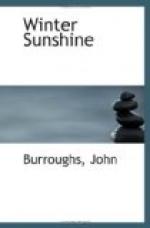I think any person who has tried it will agree with me about the charm of sugar-making, though he have no tooth for the sweet itself. It is enough that it is the first spring work, and takes one to the woods. The robins are just arriving, and their merry calls ring through the glades. The squirrels are now venturing out, and the woodpeckers and nuthatches run briskly up the trees. The crow begins to caw, with his accustomed heartiness and assurance; and one sees the white rump and golden shafts of the high-hole as he flits about the open woods. Next week, or the week after, it may be time to begin plowing, and other sober work about the farm; but this week we will picnic among the maples, and our camp-fire shall be an incense to spring. Ah, I am there now! I see the woods flooded with sunlight; I smell the dry leaves, and the mould under them just quickened by the warmth; the long-trunked maples in their gray, rough liveries stand thickly about; I see the brimming pans and buckets, always on the sunny side of the trees, and hear the musical dropping of the sap; the “boiling-place,” with its delightful camp features, is just beyond the first line, with its great arch looking to the southwest. The sound of its axe rings through the woods. Its huge kettles or broad pans boil and foam; and I ask no other delight than to watch and tend them all day, to dip the sap from the great casks into them, and to replenish the fire with the newly-cut birch and beech wood. A slight breeze is blowing from the west; I catch the glint here and there in the afternoon sun of the little rills and creeks coursing down the sides of the hills; the awakening sounds about the farm and the woods reach my ear; and every rustle or movement of the air or on the earth seems like a pulse of returning life in nature. I sympathize with that verdant Hibernian who liked sugar-making so well that he thought he should follow it the whole year. I should at least be tempted to follow the season up the mountains, camping this week on one terrace, next week on one farther up, keeping just on the hem of Winter’s garment, and just in advance of the swelling buds, until my smoke went up through the last growth of maple that surrounds the summit.




